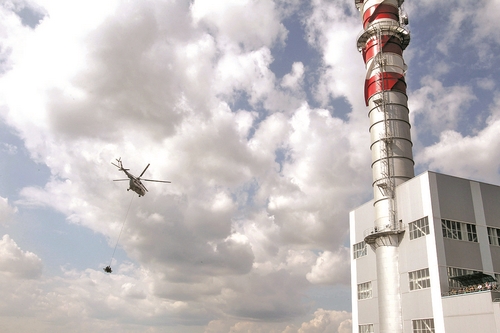Globally, cyber-terrorism aims at seizing strategically important sites, notes Alexander, of the Belarusian KGB Counter-Terrorist Directorate. During drills, the lieutenant-colonel co-ordinated all the special task forces. He tells us, “We realise that terrorist actions tend to escalate, but we’re ready to ward off any threat. At the hydro-electric station, we’re mastering appropriate interception techniques, with the aim of freeing hostages, capturing offenders, and preserving the plant.”

Helicopters involved in training exercises. Photo BelTA
The first stage was held recently in Armenia, Belarus, Russia, Kazakhstan and Kyrgyzstan. According to the scenario of the CIS Antiterrorist Centre, state security and intelligence agencies country-wide identified and apprehended terrorists instigating a DDos IT attack on servers at vital Belarusian sites. Hackers, including employees of Lukoml power plant, responded by attempting to install malicious software. Security services prevented the cyber attack, resulting in offenders implementing an alternative plan.
Understanding that they wouldn’t leave the plant alive, they began attempting escape in groups. The first group failed, as special police forces and Internal Affairs Ministry interior troop task forces blocked exits. After a short gun battle, hiding behind hostages, the terrorists retreated to a fuelling station. Elite forces deployed to the roof, while five Alpha combat groups stormed the building and Emergency Ministry helicopters aviation provided air cover. The storm troopers dispersed gas and threw flash bang grenades into windows, to disorient the enemy. Meanwhile, border service elite task force boats, military swimmers, helicopters and Berkut drones prevented the offenders from escaping via a lake nearby. Those left in the main building then changed tactic, threatening to create an explosion and shoot hostages unless they were given free passage. Their demands were met but, as soon as their requested bus departed, special forces blocked the road, with Mars stormer machinery nearby.
The Alpha fighters saw success when a rapid deployment task force entered the hydro power plant, from the main entrance, quietly and quickly, overwhelming the terrorists in their main hub and freeing hostages.
Train capture is, apparently, the most difficult scenario, according to the professionals.
The Emergency Ministry rescue services also showed a stunning performance. When terrorists managed to blow up a facility next to the energy unit’s steam turbine, rescuers had to respond quickly, since destruction could have caused the collapse of all systems.
While one group was extinguishing a fire, the other evacuated people via the roof. Alexey Semenov, an aerial rescuer with Vityaz regional unit, tells us, “I quickly descended and anchored a rope to lower a cable chair for the injured. Of course, a real emergency situation could be unpredictable, so experience and skills are of paramount importance.”
We remain unaware of the work of task forces, going about our daily lives, but we can be assured that Belarusian security is recognised as among the world’s best: in terms of skills and equipment. International events such as this prove it to be true, despite our modest size. As the joke goes: ‘Why don’t crocodiles live here? Because they’re afraid of sharks’.
By Lyudmila Gladkaya











